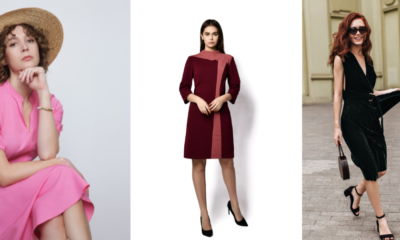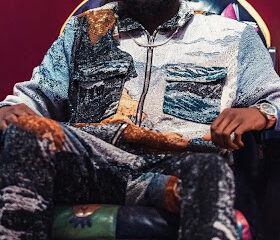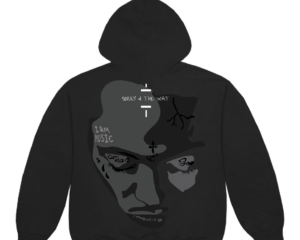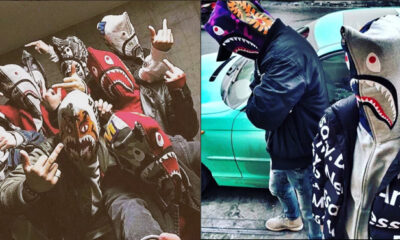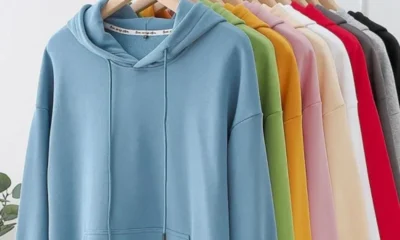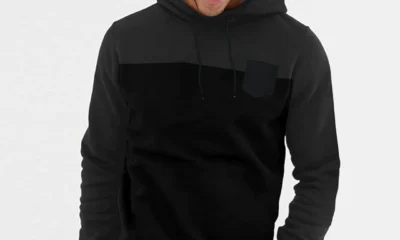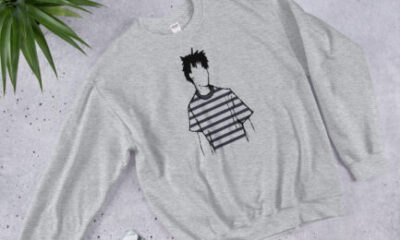Fashion
10 Eco-Friendly Fashion Brands to Watch

In today’s world, where the impact of fast fashion is more evident than ever, many consumers are seeking alternatives that are kinder to the planet. Eco-friendly fashion brands are not just a trend; they represent a movement towards sustainability and responsible consumption. Here, we spotlight ten innovative brands that are making significant strides in the realm of sustainable fashion, each with unique approaches to protecting our environment while offering stylish options.
Key Takeaways
- PANGAIA focuses on natural materials and has initiatives to protect bees.
- Vuori is a climate-neutral brand that offsets its carbon emissions.
- Finisterre raises awareness about ocean conservation through its products.
- Patagonia leads the way in sustainable clothing and ethical practises.
- Stella McCartney uses innovative materials and tracks sustainability through blockchain.
01. PANGAIA
PANGAIA is a brand that focuses on natural materials to create its clothing. This streetwear label is known for its simple and comfortable designs, which have a minimal impact on the environment. Here are some key points about PANGAIA:
- Materials Science: The brand develops sustainable fabrics, including plant-based denim made from hemp.
- Innovative Alternatives: They offer an alternative to feather down, made from flowers.
- Environmental Initiatives: PANGAIA is involved in various projects, such as the ‘Bee The Change’ initiative, which aims to protect bee populations.
Key Features of PANGAIA
| Feature | Description |
|---|---|
| B Corp Certified | Recognised for social and environmental impact |
| Regenerative Forest Projects | Supports sustainable forestry initiatives |
| ‘Rewear’ Circular Platform | Encourages recycling and reusing clothing |
PANGAIA is not just a clothing brand; it’s a movement towards a more sustainable future in fashion. Their commitment to using eco-friendly materials is a step in the right direction for the industry.
02. Vuori
Vuori is a California-based brand that focuses on athletic and leisure wear. This brand stands out because it is 100% climate-neutral, meaning it has offset all its carbon emissions. Vuori has made significant strides in sustainability by partnering with CleanHub to completely offset its plastic impact. Here are some of the key features of Vuori’s eco-friendly practises:
- Recycled Materials: The brand uses recycled materials for its garment bags.
- Plastic Reduction: Vuori aims to reduce plastic use in its supply chain by 80%.
- Transparency: The company has set clear sustainability goals, including a 42% reduction in Scope 1 and 2 emissions by 2030.
Environmental Initiatives
Vuori is also involved in various environmental programmes worldwide. Some of these initiatives include:
- Supporting efforts to stop deforestation in Borneo.
- Funding emission-reduction projects in the US.
- Collaborating with organisations like Pachama and 3Degrees to offset carbon emissions.
Vuori is committed to making a positive impact on the environment while providing high-quality, stylish clothing for its customers. Their dedication to sustainability sets a new standard in the fashion industry, making them a brand to watch.
03. Finisterre

Ocean Awareness
Finisterre is a brand that truly cares about our oceans. They focus on creating clothing that is not only stylish but also environmentally friendly. Founded in 2003, the brand aims to raise awareness about ocean conservation through its products and initiatives.
Sustainable Practises
Finisterre uses a variety of sustainable materials in their clothing, including:
- Recycled fabrics: They incorporate materials like recycled polyester to reduce waste.
- Organic cotton: This is grown without harmful chemicals, making it better for the environment.
- Eco-friendly packaging: Their packaging is designed to be as sustainable as possible.
Community Engagement
The brand actively engages with the community to promote ocean health. They:
- Organise beach clean-ups to remove plastic waste.
- Collaborate with ocean conservation charities.
- Educate customers about the importance of protecting marine life.
Finisterre believes that every small action counts in the fight against ocean pollution. By choosing their products, you are supporting a brand that prioritises the planet.
Future Goals
Finisterre is committed to:
- Reducing their carbon footprint.
- Increasing the use of sustainable materials.
- Expanding their community outreach programmes.
In summary, Finisterre is a brand that not only offers stylish clothing but also champions the cause of ocean conservation, making it a noteworthy choice for eco-conscious consumers. Their dedication to sustainability and community involvement sets them apart in the fashion industry.
04. Patagonia
Patagonia is a leading name in the outdoor clothing world, known for its commitment to sustainable practises. Founded by Yvon Chouinard over fifty years ago, the brand has made significant strides in promoting eco-friendly fashion. Here are some key points about Patagonia:
- Sustainable Materials: Patagonia uses materials like recycled cotton, hemp, and biobased polyester in its products.
- Fair Trade Certified: The brand ensures that its factories meet fair trade standards, supporting workers’ rights.
- Environmental Donations: Through the 1% for the Planet initiative, Patagonia has donated over $140 million to grassroots environmental groups.
| Feature | Details |
|---|---|
| Founded | 1973 |
| CEO | Yvon Chouinard |
| Donations to Environment | $140 million |
| Sustainable Materials Used | Recycled cotton, hemp, biobased polyester |
Patagonia not only sells clothing but also encourages customers to engage with local environmental initiatives through its Patagonia Action Works platform. This helps connect shoppers with local charities and events focused on sustainability.
In summary, Patagonia stands out as a pioneer in the sustainable fashion movement, making it a brand to watch for eco-conscious consumers.
05. Passenger
Passenger is a brand that focuses on creating stylish and sustainable clothing. Their commitment to the environment is evident in every piece they produce. They use organic materials and ethical practises to ensure that their products are not only fashionable but also eco-friendly.
Key Features of Passenger:
- Sustainable Materials: All clothing is made from organic cotton, recycled polyester, and other eco-friendly fabrics.
- Ethical Production: They ensure fair wages and safe working conditions for all workers involved in the production process.
- Community Engagement: Passenger actively supports local communities through various initiatives, helping to empower those in need.
Why Choose Passenger?
- Quality: Their products are designed to last, reducing the need for frequent replacements.
- Style: They offer a range of trendy designs suitable for various occasions.
- Transparency: Passenger is open about their production processes and the materials they use.
Passenger is not just a brand; it’s a movement towards a more sustainable future in fashion. By choosing their products, you are making a positive impact on the planet and supporting ethical practises in the industry.
| Feature | Description |
|---|---|
| Materials | Organic cotton, recycled polyester |
| Production | Fair wages, safe working conditions |
| Community Support | Initiatives to empower local communities |
06. Stella McCartney

Stella McCartney is a leading name in eco-friendly luxury fashion. Based in London, this brand focuses on creating stylish clothing while being kind to the planet. Here are some key points about Stella McCartney:
- Sustainable Materials: The brand uses eco-conscious materials like organic cotton and recycled polyester.
- Animal-Friendly: Stella McCartney never uses leather or fur, opting for innovative alternatives instead.
- Transparency: They track their materials’ lifecycle using blockchain technology, ensuring sustainability in their supply chain.
| Feature | Details |
|---|---|
| Based in | London, UK |
| Product Range | Women’s and kid’s fashion, accessories, bags, footwear |
| Price Range | $$-$$$ |
Stella McCartney believes that fashion can be both beautiful and sustainable. By using innovative materials and ethical practises, she shows that luxury does not have to come at the expense of the environment.
In summary, Stella McCartney stands out as a brand that combines style with sustainability, making it a top choice for eco-conscious consumers.
07. Story MFG
Best For: Social Activism
Story MFG believes that fashion can be a powerful tool for social change. The brand is dedicated to creating clothing that not only looks good but also helps the planet. Here are some key points about their approach:
- Waste Reduction: Instead of throwing away leftover materials, Story MFG uses them in their designs, which helps to cut down on waste.
- Regenerative Agriculture: They support farming methods that restore the land, avoiding harmful chemicals and promoting healthier soil.
- Natural Dyes: Their products are dyed using natural colours sourced from a replanted forest, which also helps the environment.
| Feature | Description |
|---|---|
| Built-to-Last Products | Designed for durability and longevity. |
| Vegan and Cruelty-Free | All items are made without animal products. |
| Commitment to Sustainability | Acknowledges the journey towards full sustainability. |
Story MFG is realistic about its sustainability goals, recognising that the fashion industry still has a long way to go. However, they are committed to making a positive impact and inspiring others to do the same.
08. Greater Goods
Best For: Upcycling
Other Features: Reclaimed Materials, Brand Collaboration
Greater Goods is a London-based brand that excels in upcycling. This innovative label focuses on transforming old garments into stylish streetwear, effectively reducing waste in the fashion industry. Research indicates that a rubbish truck full of clothes is discarded every second, contributing to environmental harm. Greater Goods aims to combat this by repurposing these items.
The founder of Greater Goods believes in turning ‘nothing into something’ by combining unique materials from discarded clothing. Their collaborations with major brands, such as Nike, often result in garments that showcase a patchwork of textiles from unused products.
Key Features:
- Upcycling: Transforming old clothes into new designs.
- Collaborations: Partnering with well-known brands to create unique pieces.
- Sustainability: Reducing waste and promoting eco-friendly practises.
Greater Goods is not just a brand; it’s a movement towards a more sustainable fashion future, where every piece tells a story of renewal and creativity.
Impact on the Environment
| Aspect | Description |
|---|---|
| Waste Reduction | Significant decrease in landfill contributions |
| Material Reuse | Utilises reclaimed materials for new designs |
| Environmental Awareness | Promotes sustainable practises in fashion |
09. Camper
Best for: Responsible Materials
Camper is a well-known footwear brand that started in Spain in 1975. The company focuses on using responsible materials in its products. They have a motto: "a little better, never perfect," which reflects their ongoing commitment to sustainability.
Other Features:
- Repairing and refurbishing scheme
- Better energy programme
- Recycled and certified organic cotton
Camper aims to have 100% of its materials be responsible by 2030. They are exploring options like recycled leather and synthetic alternatives to reduce their environmental impact. The brand also tracks the journey of its materials from the raw state to the end of their life cycle.
Camper is dedicated to making shoes that are not only stylish but also kinder to the planet.
Key Initiatives:
- Sustainable Materials: Constantly searching for better materials.
- Energy Efficiency: Implementing better energy practises in production.
- Transparency: Tracing materials throughout their lifecycle.
By focusing on these areas, Camper is setting a strong example in the fashion industry for how brands can be more eco-friendly and responsible.
10. Yes Friends
Best For: Ethical Manufacturing
Yes Friends is committed to creating clothing that is not only stylish but also ethical. This brand focuses on supporting garment workers by ensuring they receive fair wages and good working conditions. Here are some key features of Yes Friends:
- Solar-powered factories: They use renewable energy to reduce their carbon footprint.
- Organic and Fairtrade cotton: This ensures that the materials used are grown sustainably and ethically.
- Minimal garment waste: They strive to keep waste to a minimum during production.
Impact on Workers
Less than 2% of garment workers earn a fair living wage, leading many to live in poverty. Yes Friends aims to change this by:
- Providing excellent wages to workers.
- Ensuring bonuses are given directly to them.
- Promoting fair treatment in the workplace.
According to their website, adding just 10p to the price of a garment can increase wages by 50%. This small change can make a big difference in the lives of workers.
Yes Friends believes that ethical fashion can lead to a positive impact on both people and the planet. By prioritising fair wages and sustainable practises, they are paving the way for a better future in the fashion industry.
Conclusion
Yes Friends is a brand to watch for anyone interested in ethical fashion. Their commitment to sustainability and fair treatment of workers sets a strong example for the industry.
Final Thoughts on Eco-Friendly Fashion
In conclusion, the rise of eco-friendly fashion brands shows that we can enjoy stylish clothing while caring for our planet. The brands we’ve discussed are leading the way in making fashion more sustainable and responsible. By choosing to support these companies, we not only help reduce waste but also encourage a shift towards better practises in the fashion industry. As consumers, we have the power to make choices that benefit both ourselves and the environment. Let’s continue to seek out and support brands that prioritise sustainability, ensuring a brighter future for fashion and our world.
-

 Press Release5 days ago
Press Release5 days agoClinical Trials Market Set for Robust Growth, Driven by Drug Development Surge and Digital Innovation
-

 Press Release6 days ago
Press Release6 days agoGreen Bio Chemicals Market Poised for Sustainable Growth amidst Global Shift to Eco-Friendly Alternatives by 2035
-

 Press Release6 days ago
Press Release6 days agoFill-Finish Pharmaceutical Contract Manufacturing Market Expected to Flourish Amid Biopharmaceutical Boom and Global Outsourcing Trend by 2035
-

 Press Release6 days ago
Press Release6 days agoIndustrial Boiler Market Expected to Surpass USD 24.4 Billion by 2035 Amid Growing Demand for Energy Efficiency and Industrialization
-

 Press Release6 days ago
Press Release6 days agoPreventive Vaccines Market to Witness Strong Growth by 2035
-

 Press Release6 days ago
Press Release6 days agoPet Food Nutraceutical Market Set for Robust Expansion Amid Rising Demand for Pet Wellness by 2035
-

 Press Release5 days ago
Press Release5 days agoPediatric Vaccines Market: Safeguarding Futures, Driving Growth
-

 Press Release6 days ago
Press Release6 days agoCat Food Market Forecast 2035: Natural Ingredients, Pet Wellness to Lead the Way




